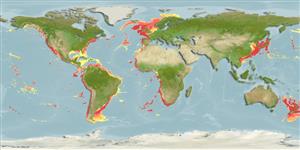Elasmobranchii (sharks and rays) >
Hexanchiformes (Frill and cow sharks) >
Chlamydoselachidae (Frilled sharks)
Etymology: Chlamydoselachus: chlamydos (Gr.), cloak or mantle, referring to first pair of gill slits that fit like a cloak or frill around throat; selachos (Gr.), a cartilaginous fish (i.e., shark or ray). (See ETYFish); anguineus: Latin for snake-like, referring to its snake- or eel-like shape. (See ETYFish).
More on author: Garman.
Environment: milieu / climate zone / depth range / distribution range
Ecology
Marine; bathydemersal; depth range 0 - 1570 m (Ref. 10290), usually 120 - 1280 m (Ref. 247). Deep-water; 74°N - 58°S, 169°W - 180°E (Ref. 84631)
Wide-ranging but with patchy distribution. Western Indian Ocean: off South Africa. Western Pacific: off Japan to New Zealand. Eastern Pacific: southern California, USA to northern Chile. Eastern Atlantic: northern Norway to northern Namibia, possibly the eastern Cape of Good Hope, South Africa. Three specimens have been recorded from the western Atlantic (Ref. 13608).
Length at first maturity / Size / Weight / Age
Maturity: Lm 145.0, range 135 - 150 cm
Max length : 200 cm TL male/unsexed; (Ref. 26346)
Dorsal
spines
(total): 0;
Dorsal
soft rays
(total): 0;
Anal
spines: 0;
Anal
soft rays: 0;
Vertebrae: 146 - 171. Eel-like shark with 6 gill slits, the lower ends of the first gill slits connected t each other across throat (Ref. 247). Dark brown or grey in color, sometimes paler below (Ref. 26346). Dorsal fin small and lobe-like originating over pelvic fin bases to behind anal fin origin (Ref. 6871). Anal fin larger than dorsal fin (Ref. 6871). Pectoral fins small and paddle-shaped (Ref. 6871). Caudal fin with weak ventral lobe and without subterminal notch (Ref. 6871). Terminal mouth with tricuspid teeth in both jaws (Ref. 247).
An uncommon primitive shark (Ref. 26346) found on outer continental and insular shelves and upper slopes, usually between 120 and 1,280 m but occasionally caught at the surface (Ref. 247). Feeds on other sharks, squid and bony fish (Ref. 26346). Ovoviviparous (Ref. 50449), litter size ranges from 2 to 10 (Ref. 37390). Not dangerous but teeth are sharp enough to inflict lacerations on the hands of the unwary scientist examining its mouth (Ref. 247). Incidental in bottom trawl catches and utilized as fishmeal and as food fish (Ref. 247).
Ovoviviparous, embryos feed solely on yolk (Ref. 50449). Number of young 2 to 15 (Ref. 26346). Gestation period is probably very long, one to two years (Ref. 39551). Size at birth 40-60 cm (Ref. 6871). Distinct pairing with embrace (Ref. 205).
Compagno, L.J.V., 1984. FAO Species Catalogue. Vol. 4. Sharks of the world. An annotated and illustrated catalogue of shark species known to date. Part 1 - Hexanchiformes to Lamniformes. FAO Fish. Synop. 125(4/1):1-249. Rome, FAO. (Ref. 247)
IUCN Red List Status (Ref. 130435)
Human uses
Fisheries: minor commercial
More information
ReferencesAquacultureAquaculture profileStrainsGeneticsElectrophoresesHeritabilityDiseasesProcessingNutrientsMass conversion
Tools
Special reports
Download XML
Internet sources
Estimates based on models
Preferred temperature (Ref.
123201): 2.3 - 16.4, mean 7.4 °C (based on 1257 cells).
Phylogenetic diversity index (Ref.
82804): PD
50 = 1.0156 [Uniqueness, from 0.5 = low to 2.0 = high].
Bayesian length-weight: a=0.00389 (0.00180 - 0.00842), b=3.12 (2.94 - 3.30), in cm total length, based on all LWR estimates for this body shape (Ref.
93245).
Trophic level (Ref.
69278): 4.2 ±0.4 se; based on diet studies.
Resilience (Ref.
120179): Very Low, minimum population doubling time more than 14 years (Fec=2).
Fishing Vulnerability (Ref.
59153): Very high vulnerability (90 of 100).
